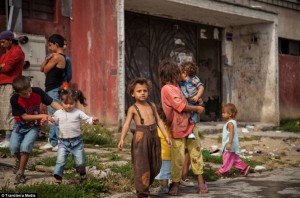Thathiana Gurgel – Community Post: How an Informal Post Office Connects Rio’s Slums
 sustainablecitiescollective.com. November 21, 2013. Five years after the implementation of the Pacifying Police Unit – a law enforcement program aimed at reclaiming territories controlled by gangs – many utilities and services in Rio de Janeiro still have difficulty operating in the city’s slums. This is the case of the Post Office, which fails to deliver mail in the streets and alleys of Rio hills. According to the Rio de Janeiro Post Office, the reason for this is a lack of “signposts and ordered numbering, and overall conditions of access.” To overcome this shortage, slum dwellers have created informal organizations such as the “Community Post”, which works in the Vidigal neighborhood.
sustainablecitiescollective.com. November 21, 2013. Five years after the implementation of the Pacifying Police Unit – a law enforcement program aimed at reclaiming territories controlled by gangs – many utilities and services in Rio de Janeiro still have difficulty operating in the city’s slums. This is the case of the Post Office, which fails to deliver mail in the streets and alleys of Rio hills. According to the Rio de Janeiro Post Office, the reason for this is a lack of “signposts and ordered numbering, and overall conditions of access.” To overcome this shortage, slum dwellers have created informal organizations such as the “Community Post”, which works in the Vidigal neighborhood.
Mail Community was created in 1997 by four friends who wanted to do something good for Vidigal’s slums and at the same time generate employment. “We had seen services like this in the Itanhangá neighborhood. We saw how the project worked there and decided to launch something similar in Vidigal,” says Edson Pepper, one of the founders of the program. “We decided to go from house to house in Vidigial to announce our service and earn the confidence of the owner.” For two months, Mail Community offered free delivery to earn the trust of the locals and get them used to the service.
Read more: http://sustainablecitiescollective.com/
Giles Parkinson – Australian Solar Lighting Project In Indian Slums Wins UN Award
reneweconomy.com.au. November 20, 2013. An Australian founded clean energy company that is allowing slum-dwellers in India to replace expensive and highly polluting kerosene lamps with cheaper solar energy is to receive an award at the UN climate change talks on Wednesday.
Pollinate Energy is one of two Australian initiatives to get awards under the Lighthouse initiative for the UN’s Momentum for Change program. The other is the Australian-based 1 Million Women initiative, which aims to build a movement to get one million women to take small steps in their everyday lives to cut emissions.
The not-for-profit Pollinate Energy began its operations in the slums of Bangalore, initially with the aim of allowing children to do school work after the sun sets, and to reduce reliance on kerosene lamps, which eats up a large part of incomes with fuel costs and can cause health problems, burns and fires.
Read more: http://reneweconomy.com.auaustralia-solar-lighting-project-indian-slums
Denise Nawara – Housing Rights In Melanesia: Women Live In The Shadow Of Silence In Squatter Settlements
pacmas.org. November 18, 2013. Denise Nawara was a participant at the PACMAS-funded Housing Rights in Melanesia workshop. Here, she explores how women are disproportionately affected by a lack of housing rights through the experience of two Solomon Islands women living in the squatter settlement of Kalekana on Suva’s outskirts.
While shelter is a basic need and a key indicator of development and social wellbeing, the women of Kalekana, a few kilometres outside Fiji’s capital, Suva, have for decades suffered in the shadows of silence. Here, where direct descendants of Solomon Islanders call home, chronic water shortage and poor hygiene have plagued families for generations, some as long as 60 years.
Women like Akesa Tinai, who have young children to raise, feed and send to school without the presence of their husbands, suffer the most. Akesa lives in a cramped four-room flat that does not have running water and toilet facilities, compounding her burden of bringing up five children on a meagre budget. When there is no money, she often skips lunch so that her children can have food after school. They sometimes have tea with rice or
Read more: http://www.pacmas.org/housing-rights-in-melanesia
Lizzie Edmonds ~ Slumdogs Of Slovakia
These heartbreaking pictures show the squalid conditions that thousands of Roma children are forced to call home in the city of Kosice, Slovakia.
The city, the largest in eastern Slovakia, received £51 million when it was named the European Capital of Culture 2013 alongside Marseille, France. The money is to be invested into the city’s infrastructure, creative industries and tourism.
However, in the suburb of Lunik IX around 8,000 Slovakian Roma, most of them children, live in squalor in one of the world’s worst slums.
See more: http://www.dailymail.co.uk/Kosice
Issa Sikiti Da Silva – South Africa’s Low-Income Earners Face Long Wait For Decent Houses
moonofthesouth.com. November 15, 2013. South Africa’s low-income earners will have to wait a little bit longer before getting a mortgaged house, as the issue of affordability continues to hamper the housing finance market on the African continent.
Though the affordable housing market in South Africa is defined as households earning between R3 500 and R25 000 (about US$350 and US$2500), First National Bank (FNB) said last week that currently there is no supply of houses to a household earning between R3 500 and R9 000 in the country.
The bank’s survey shows that 96% of people knocking on its doors for a financed house are first-time homeowners who are most affected by issues of affordability and economic risks such as interest rate increases, inflationary pressures and unemployment.
The African Union for Housing Finance (AUHF) recently identified affordability of formal housing as one of the key areas where governments, private sector and development finance institutions should urgently focus on to enhance the performance of Africa’s housing markets.
Read more: http://moonofthesouth.com/south-africas-low-income-earners/



